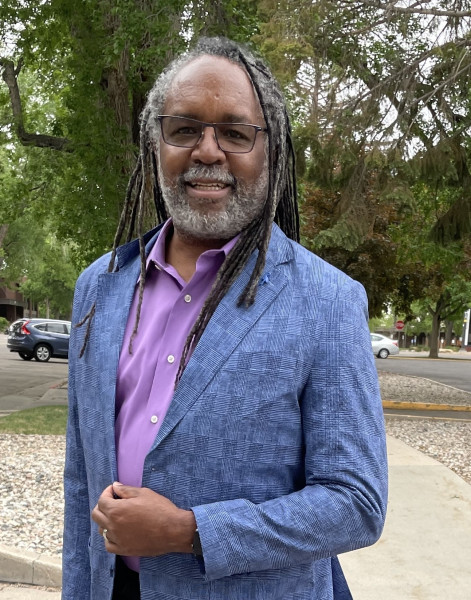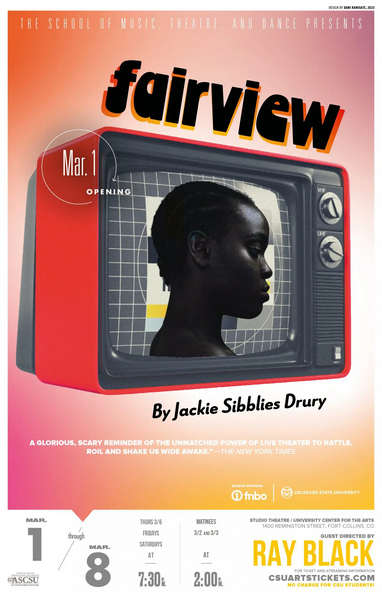Story by Sarah Dills
Whether surrounded by plush theater seats or among students in desks, Ray Black stands before a captivated audience, skillfully crafting and sharing narratives filled with emotion, depth and meaning to convey a profound message.
“One of the ways that you educate people [and show] how the world is outside of your spectrum is to put it on a stage,” Black said. “The stage isn’t always like the LSC theater or going downtown and paying to get tickets. The stage is where people gather and where people tell a set of stories to one another. A traditional 50 or 75-minute lecture isn’t the only way, nor always the most effective method, to extend a lesson to a wide audience.”
Black, an associate professor in the Department of Ethnic Studies, specializes in African American studies, specifically history, media and protest. This spring, he is guest-directing “Fairview,” written by Jackie Sibblies Drury, for CSU’s School of Music, Theatre and Dance.

Black has experience in many theater productions, including acting in August Wilson’s “Piano Lesson,” and writing, producing and directing plays for the Sacramento Repertory Theater youth program.
The 2019 Pulitzer Prize-winning play “Fairview” is a drama featuring an African American household hosting a birthday party for their grandmother.
“Without giving too much away, it’s a Black family sitcom with all of the worldly events happening to it and into it,” Black said. “It’s fun, but it also provides a way of seeing how we look at each other and understand each other from racial and gender perspectives.”
By breaking the fourth wall, “Fairview” invites the audience to become more than just observers and to metaphorically insert themselves into the story.
“It’s fun, but it also provides a way of seeing how we look at each other and understand each other from racial and gender perspectives.”
Black sees an opportunity for the production to unite different groups of people on CSU’s campus.
“Part of the reason Dr. Megan Lewis and I thought I’d be a good fit for [directing] is because there are the Black students in the theater program who may interact with the Black Cultural Center but not necessarily with the Ethnic Studies department, or students in the Ethnic Studies department will not know about theater. This is a chance to bring them all [together].”
Black hopes his involvement will encourage cross-discipline interest in attending “Fairview,” and that the distance across College Avenue to the University Center for the Arts won’t feel so vast.
When most people think about Black theater, decades-old classics come to mind, such as Lorraine Hansberry’s “Raisin in the Sun” or August Wilson’s “Fences.” “Fairview” is an example of the new wave of Black theater.
“Now, with Jackie Sibblies Drury and Lynn Nottage, you have this new generation of playwrights that are taking on issues and themes in different ways,” Black said. “One of the things that connects Drury and ‘Fairview’ to very early Black theater is how white people see Black people.”

One purpose of “Fairview” is to recognize yourself in the story.
“We are either the family, or we are those who are watching that family, or in some ways, imposing our expectations onto the family,” Black explained.
The audience is invited to examine the expectations that they may be placing on the “other” and recognize unintentional or lingering prejudices or stereotypes.
“We are either the family, or we are those who are watching that family, or in some ways, imposing our expectations onto the family…”
Giving an example that he uses in his classes, Black asked, “If you have the choice between two O’s, why is it that people will pick OJ [Simpson] instead of Obama? What is it that is attractive about the negative Black stereotypes as opposed to the positive Black stereotypes? These perspectives have been going on for 500 years.
“So that’s where this play connects to the past and the deep history and the present because we still have issues with how Black people are seen.”
In addition to the important messages and nod toward self-reflection, Black hopes the audience will enjoy the show and appreciate all the hard work of the cast and crew.
“It’s an opportunity to see each other and talk to each other and sit down and have that shared experience,” he said. “And have some fun! And enjoy some very talented actors. It’s a good time.”
“Fairview” is running from March 1 through March 8 at the UCA. Tickets are available at csuartstickets.com.